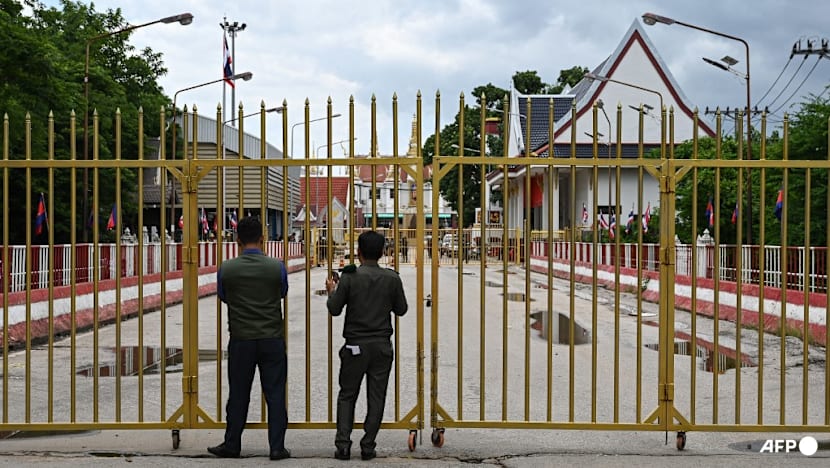South Korea bars travel to parts of Cambodia amid concerns over scam centres and reported kidnappings
The recent death of a Korean college student in Cambodia - reportedly kidnapped and tortured by a local crime ring - has shocked South Korea.

Cambodian police officials stand next to the closed gate at Poipet international border checkpoint between Cambodia-Thailand, at Poipet town in Banteay Meanchey province on Jun 24, 2025. (Photo: AFP/Tang Chhin Sothy)
SEOUL: South Korea on Wednesday (Oct 15) issued travel bans on parts of Cambodia over growing concerns about its citizens being lured to scam centres in the Southeast Asian country.
The recent death of a Korean college student in Cambodia - reportedly kidnapped and tortured by a local crime ring - has shocked South Korea.
"The Bokor Mountain area in Kampot Province, Bavet City, and Poipet City are designated as travel ban zones," the foreign ministry said in a statement.
"South Korean nationals visiting or staying in those areas may be subject to penalties under the Passport Act and other relevant regulations. Citizens planning to travel to such areas are therefore strongly advised to cancel their trips," it said.
About 1,000 South Koreans are believed to be working in online scam operations in Cambodia, Seoul said on Wednesday.
South Korea will send a special team to the Southeast Asian country later on Wednesday to discuss cases of fake jobs and scam centres involved in kidnapping dozens of its nationals.
"It is believed that around 200,000 people of various nationalities are working in Cambodia's scam industry, which targets victims worldwide, including in South Korea," National Security Adviser Wi Sung-lac told reporters.
"A considerable number of South Koreans are also thought to be employed there. While the exact figure is difficult to verify, domestic authorities generally estimate the number at around 1,000."
Seoul has said 63 South Koreans were believed to have been detained by authorities in Cambodia, who were among 80 reported missing. The government was "committed to bringing all South Korean nationals back home", Wi said.
"We are arranging a flight to bring them home ... We aim to complete this by the end of the week," he said.
Of the 63 detained, there were both "voluntary and involuntary participants" in the scam operations, Wi said.
"Most of them should be regarded as having committed criminal acts" for taking part in the schemes, he said, regardless of their initial intentions.
The South Korean team, headed by the vice foreign minister, will depart on Wednesday evening, said a government official who spoke on the condition of anonymity.
TORTURED TO DEATH
Around 330 South Koreans had been reported missing or detained against their will in Cambodia between January and August this year, according to Seoul's foreign ministry, before that number was whittled down to 80.
The government plans to "make every diplomatic effort to secure Cambodia's cooperation", the presidential office said.
The response team being sent to Cambodia includes officials from the police and South Korea's spy agency, it said.
As well as repatriation discussions, police would also conduct a joint investigation into the recent death of a South Korean college student in Cambodia, the president's office said.
The death of the student in Cambodia, who was reportedly kidnapped and tortured by a crime ring there, has shocked South Korea.
Police investigations and an autopsy showed the student, whose body was found in a pickup truck on Aug 8, "died as a result of severe torture, with multiple bruises and injuries across his body", according to a Cambodian court statement.
Three Chinese nationals were charged with murder and online fraud on Aug 11 and remain in pre-trial detention, it said.
Many Korean victims of such crimes in Cambodia are said to have been lured by fraudulent job offers promising high pay, Seoul has said.
Rights group Amnesty International says abuses in Cambodia's scam centres are happening on a "mass scale".
There are at least 53 scam compounds in Cambodia where organised criminal groups carry out human trafficking, forced labour, torture, deprivation of liberty and slavery, according to Amnesty.
















